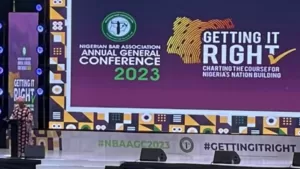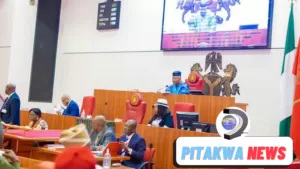NNPC Blames Weather for Fuel Scarcity.

No Fuel, No Money as Port Harcourt Residents in For a Long Day
Nigeria is currently facing a severe petrol shortage, leading to long queues at filling stations and skyrocketing black market fuel prices, reportedly reaching over ₦1,000 per liter.
The Nigerian National Petroleum Corporation Limited (NNPCL) has attributed this crisis to adverse weather conditions like rain, lightning, and thunderstorms, which they claim have disrupted fuel distribution.
However, this explanation has met with significant public skepticism, with many questioning the adequacy of these reasons given the recurring nature of fuel shortages in the country.
Additionally, the Nigerian Navy recently uncovered an illegal refinery in Rivers State, allegedly capable of producing 200 million liters of fuel daily, which has further fueled discussions about the management and distribution of fuel in Nigeria. Critics argue that such large-scale illegal operations indicate deeper issues within the fuel supply chain, possibly including mismanagement or corruption.
- Weather Impact: NNPC has explicitly blamed the scarcity on the inability to load petrol during rainstorms and lightning due to the flammability of petroleum products, following Nigerian Meteorological Agency (NIMET) regulations.
- Public and Market Reaction: There’s been skepticism and humor on social media regarding NNPC’s explanation, with some users questioning the plausibility of such weather conditions causing prolonged fuel shortages. This skepticism is partly fueled by the recurring nature of these issues, with this being the third fuel scarcity in 2024.
- Economic and Logistical Challenges: Beyond the weather, other factors contributing to the scarcity include logistical challenges in fuel distribution, the impact of a planned nationwide protest on fuel transportation, and the broader economic context like foreign exchange shortages affecting importation of petroleum products.
- Price Fluctuations: The scarcity has led to significant price increases at independent filling stations, with prices soaring to as much as N900 to N1,000 per liter in some areas, compared to NNPC’s stations where prices were slightly lower but still high due to the shortage.
- Marketers’ Perspective: Oil marketers have also pointed fingers at NNPC, noting that the national oil company’s supply issues and the broader economic policies like fuel subsidy and deregulation have complicated the situation, leading to increased costs and supply disruptions.
- Public Sentiment: There’s a mix of frustration and disbelief among the public, as reflected in X posts, where some users mock the explanation, suggesting it’s become a common excuse for fuel shortages in the country.
This situation underscores the complex interplay of weather, logistics, economic policies, and public trust in Nigeria’s fuel supply chain. While NNPC’s explanation focuses on weather disruptions, the broader context includes systemic issues within the petroleum sector’s management and distribution.







